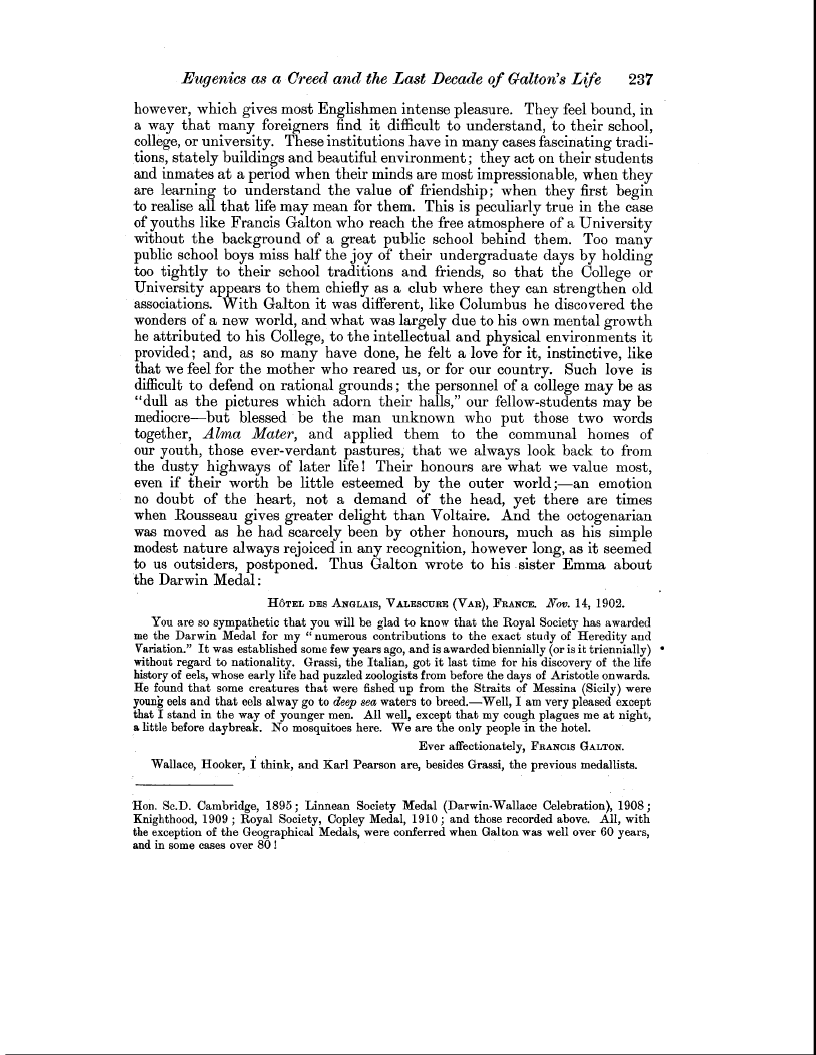| ||||||

OCR Rendition - approximate
Eugenics as a Creed and the Last Decade of Galton's Life 237 however, which gives most Englishmen intense pleasure. They feel bound, in a way that many foreigners find it difficult to understand, to their school, college, or university. These institutions have in many cases fascinating traditions, stately buildings and beautiful environment; they act on their students and inmates at a period when their minds are most impressionable, when they are learning to understand the value of friendship; when they first begin to realise all that life may mean for them. This is peculiarly true in the case of youths like Francis Galton who reach the free atmosphere of a University without the background of a great public school behind them. Too many public school boys miss half the joy of their undergraduate days by holding too tightly to their school traditions and friends, so that the College or University appears to them chiefly as a club where they can strengthen old associations. With Galton it was different, like Columbus he discovered the wonders of a new world, and what was largely due to his own mental growth he attributed to his College, to the intellectual and physical environments it provided; and, as so many have done, he felt a love for it, instinctive, like that we feel for the mother who reared us, or for our country. Such love is difficult to defend on rational grounds ; the personnel of a college may be as "dull as the pictures which adorn their halls," our fellow-students may be mediocre-but blessed be the man unknown who put those two words together, Alma Mater, and applied them to the communal homes of our youth, those ever-verdant pastures; that we always look back to from the dusty highways of later life! Their honours are what we value most, even if their worth be little esteemed by the outer world,;-an emotion no doubt of the heart, not a demand of the head, yet there are times when Rousseau gives greater delight than Voltaire. And the octogenarian was moved as he had scarcely been by other honours, much as his simple modest nature always rejoiced in any recognition, however long, as it seemed to us outsiders, postponed. Thus Galton wrote to his .sister Emma about the Darwin Medal: HOTEL DES ANGLAIS, VALESCURE (VAR), FRANCE. Yov. 14, 1902. You are so sympathetic that you will be glad to know that the Royal Society has awarded me the Darwin Medal for my "numerous contributions to the exact study of Heredity and Variation." It was established some few years ago, and is awarded biennially (or is it triennially) without regard to nationality. Grassi, the Italian, got it last time for his discovery of the life history of eels, whose early life had puzzled zoologists from before the days of Aristotle onwards. He found that some creatures that were fished up from the Straits of Messina (Sicily) were young eels and that eels alway go to deep sea waters to breed.-Well, I am very pleased except that I stand in the way of younger men. All well, except that my cough plagues me at night, a little before daybreak. No mosquitoes here. We are the only people in the hotel. Ever affectionately, FRANCIS GALTON. Wallace, Hooker, I think, and Karl Pearson are, besides Grassi, the previous medallists. 'Hon. Sc.D. Cambridge, 1895; Linnean Society Medal (Darwin-Wallace Celebration), 1908; Knighthood, 1909; Royal Society, Copley Medal, 1910; and those recorded above. All, with the exception of the Geographical Medals, were conferred when Gallon was well over 60 years, and in some cases over 80 1
|